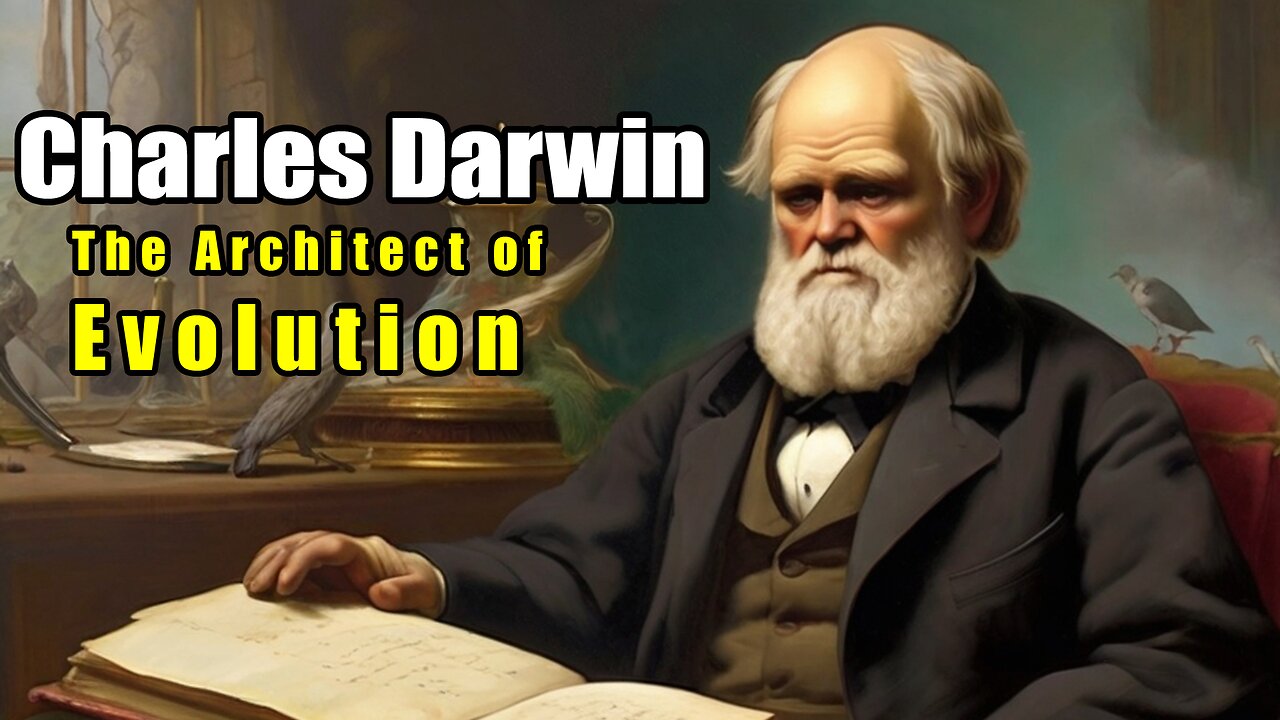Premium Only Content

Charles Darwin - The Architect of Evolution (1809 - 1882)
Charles Darwin (1809-1882) was a British naturalist and biologist who laid the foundation for the theory of evolution by natural selection. His groundbreaking work, "On the Origin of Species," published in 1859, revolutionized our understanding of the diversity of life on Earth. Here is an overview of Charles Darwin's life and his contributions to the field of evolutionary biology:
Early Life:
Born into a Scientific Family:
Charles Robert Darwin was born on February 12, 1809, in Shrewsbury, Shropshire, England. His father, Robert Darwin, was a successful physician, and his grandfather, Erasmus Darwin, was a renowned physician, naturalist, and poet.
Education:
Darwin initially studied medicine at the University of Edinburgh but found the curriculum unappealing. He later studied divinity at Christ's College, Cambridge, with the intention of becoming a clergyman.
Voyage on HMS Beagle:
Scientific Exploration:
In 1831, at the age of 22, Darwin embarked on a five-year scientific expedition aboard HMS Beagle. The voyage took him to various locations, including the Galápagos Islands, South America, Australia, and Africa.
Observations and Collections:
During the voyage, Darwin made numerous observations and collected specimens, particularly in the Galápagos, where he noted variations among species that would later contribute to his theory of evolution.
Development of the Theory of Evolution:
Influence of Thomas Malthus:
Darwin was influenced by Thomas Malthus's ideas on population growth and resource scarcity, which played a crucial role in shaping his thoughts on natural selection.
Natural Selection:
Darwin's theory of natural selection, as presented in "On the Origin of Species" (1859), proposed that species evolve over time through the differential survival and reproduction of individuals with advantageous traits.
Alfred Russel Wallace:
Darwin developed his theory independently but was prompted to publish when he received a letter from Alfred Russel Wallace, who had independently arrived at a similar theory. They presented their findings jointly in 1858.
Contributions to Biology:
Concept of Common Descent:
Darwin's theory proposed the idea of common descent, suggesting that all living organisms share a common ancestry.
Adaptation and Fitness:
Darwin emphasized the importance of adaptation to the environment and the concept of "survival of the fittest" in the context of natural selection.
Later Life:
Continued Research:
After the publication of "On the Origin of Species," Darwin continued his scientific research, publishing works on topics such as the evolution of humans, barnacles, and plants.
Descent of Man (1871):
In "The Descent of Man," published in 1871, Darwin extended his evolutionary ideas to human evolution, proposing a common ancestry for humans and other primates.
Legacy:
Impact on Science:
Charles Darwin's theory of evolution is considered one of the most important scientific ideas in history. It revolutionized biology, providing a unifying framework for understanding the diversity of life.
Controversies and Social Impact:
The theory of evolution sparked controversies, particularly regarding its implications for religious beliefs. However, it has had a profound and lasting impact on fields such as genetics, paleontology, and anthropology.
Recognition and Honors:
Darwin's contributions to science were widely recognized, and he received numerous honors, including the Royal Society's Copley Medal and being buried in Westminster Abbey.
Conclusion:
Charles Darwin's work laid the groundwork for modern evolutionary biology, fundamentally changing our understanding of the natural world. His theory of evolution by natural selection has withstood the test of time and continues to shape scientific research and education to this day. Darwin's intellectual legacy extends far beyond biology, influencing diverse fields and challenging societal norms about the origins of life.
-
 LIVE
LIVE
Slightly Offensive
3 hours ago $2.86 earnedCandace REDPILLS the Masses in BOMBSHELL Theo Von Interview | Guest: Shane Cashman
1,062 watching -
 LIVE
LIVE
megimu32
3 hours agoON THE SUBJECT: IRL Streamers Attacked & Nostalgic Animal Movies That Made Us Cry
353 watching -
 1:00:54
1:00:54
The Tom Renz Show
7 hours agoMore Epstein/FBI, a Scary Trade War, & the Dem Echo Chamber
7.49K1 -
 40:43
40:43
Kimberly Guilfoyle
7 hours agoDems Double Down on Delusion-Why? Live with Tony Kinnett & Bo French | Ep.202
77.8K31 -
 1:28:42
1:28:42
Redacted News
6 hours agoBREAKING! SOMETHING BIG IS HAPPENING IN EUROPE ALL OUT WAR IS COMING AGAINST RUSSIA, TRUMP FURIOUS
121K266 -
 47:50
47:50
Candace Show Podcast
6 hours agoBREAKING: Judge Makes Statement Regarding Taylor Swift's Text Messages. | Candace Ep 155
113K109 -

Josh Pate's College Football Show
3 hours ago $0.29 earnedCFB’s Most Hated Teams | FSU & Clemson Future | Big Ten Win Totals | Star Rankings Overrated?
14.5K -
 1:33:47
1:33:47
CatfishedOnline
4 hours agoGoing Live With Robert - Weekly Recap
27.8K -
 55:18
55:18
LFA TV
1 day agoEurope’s Sudden Turn Against America | TRUMPET DAILY 3.6.25 7PM
32.2K3 -
 4:21
4:21
Tundra Tactical
4 hours ago $2.12 earnedPam Bondi MUST Enforce Due Process NOW!
23.7K1